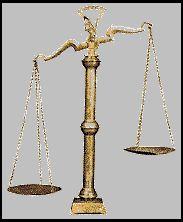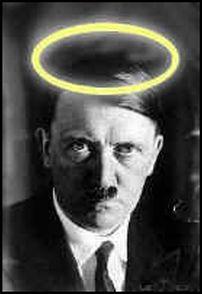 “All cats die”
“All cats die”
“Socrates is dead”
“Therefore, Socrates is a cat”
- From the logician’s “A” form proposition in Eugene Ionesco’s Rhinoceros (1959)
This morning I read a small portion of a post from a left-leaning blog that shall remain nameless. The blogger, a so-called liberal, wrote a post taunting supporters of the war in Iraq to respond to him, with ironclad evidence, about why they believed we were right to go to war to remove Saddam Hussein from power.
Most bloggers who read what he wrote decided, wisely, not to respond. The reason I say that it was a wise decision is that it was clear that no evidence, regardless of how compelling, was going to change his mind. As I saw it was a bit like getting nose to nose with a bully who’s told you politely that your shoelaces are untied. Just as soon as you look down you see the uppercut approaching your chin. In other words, there was no benevolent intent to begin with.
That didn’t stop one intrepid blogger from responding, though. He attempted to make the moral case for going to war. Our left-leaning friend read the response and replied, “George Bush never made a moral argument for this war.” The logic was amazing. Since George Bush failed to make a moral case for ousting Saddam, the reasoning went, there was no moral case at all.
To make it a bit clearer I’ll put it in syllogism form, so that you can compare it to the logic Eugene Ionesco ridiculed in his 1960 classic. It looks something like this:
There may have been a moral case for invading Iraq
George Bush made no moral case for invading Iraq
Therefore, there was no moral case for invading Iraq
If weren’t such a serious error it would be as silly as the syllogism Ionesco used to poke fun at the logician in his play “Rhinoceros.”
But while it might be funny to attempt to prove that Socrates is a cat or, for that matter, that a dog is a cat (both usually have four legs), using such flawed reasoning to support an anti-war position serves no useful purpose. It’s not only counter-productive, it’s dangerous.
The reason for logical, clear thinking is to clarify and enlighten and the blogger’s logic only revealed a lack of understanding, possibly under-girded by intense hatred of George Bush. That’s not good interpersonal logic and it’s not a foundation sound enough to build a worldview on.
That, however, hasn’t stopped the left from pushing the anti-war button. In addition to the logic used there are mantras that go with the territory. How often have we heard in the past two or three years, “I know that Saddam Hussein was a brutal tyrant, but…..” I think you all know what’s coming next. “But it’s an internal matter.” “Didn’t we prop him up in the seventies and eighties?” “If he was our ally in the seventies, how has he become our enemy now?” “It’s none of our business.” “Why should Americans die if others aren’t willing to die for this cause along with us?”
There are other questions, but I believe I’ve provided enough to make my point.
I’ve said since the beginning of our involvement in Iraq that the moral case for invading and overthrowing Saddam was the most compelling. Nothing that’s happened since has changed my mind. During that time, I’ve made the case in writing. What I’d like to do now is once again put my reasons for supporting the initial invasion and the ongoing effort in moral terms.
The morality of the cause can be expressed in sweeping terms. First, it can be expressed in American political terms. Next, in can be expressed in geopolitical terms. Then, it can be expressed in theological terms. Finally, it can be expressed in local and interpersonal terms.
I’m a Democrat. “Why,” you ask, “Would a Democrat support “George Bush’s War?” I do so, because I believe the cause is just and I do so because Democrats have, until the past thirty years, supported just causes. For example, in his
declaration of war against Germany and the Axis powers on April 2, 1917, Woodrow Wilson made the following observation about the false sense of security that neutrality had brought the country:
“Our object now, as then, is to vindicate the principles of peace and justice in the life of the world as against selfish and autocratic power and to set up among the really free and self-governed peoples of the world such a concert of purpose and of action as will henceforth ensure the observance of those principles. Neutrality is no longer feasible or desirable where the peace of the world is involved and the freedom of its peoples, and the menace to that peace and freedom lies in the existence of autocratic governments backed by organized force which is controlled wholly by their will, not by the will of their people. We have seen the last of neutrality in such circumstances. We are at the beginning of an age in which it will be insisted that the same standards of conduct and of responsibility for wrong done shall be observed among nations and their governments that are observed among the individual citizens of civilized states.”
“We have no quarrel with the German people. We have no feeling toward them but one of sympathy and friendship. It was not upon their impulse that their government acted in entering this war. It was not with their previous knowledge or approval. It was a war determined upon as wars used to be determined upon in the old, unhappy days when peoples were nowhere consulted by their rulers and wars were provoked and waged in the interest of dynasties or of little groups of ambitious men who were accustomed to use their fellowmen as pawns and tools.”Wilson’s declaration and statement of principles was powerful, and these principles were being advanced by the leader of the Democratic Party.
John F. Kennedy, the President I identified with in my youth, made it clear to the world that the United States was going to advance the principles Woodrow Wilson had outlined two generations earlier.
His words have found an honored place in history:
“We observe today not a victory of party, but a celebration of freedom—symbolizing an end, as well as a beginning—signifying renewal, as well as change. For I have sworn before you and Almighty God the same solemn oath our forebears prescribed nearly a century and three quarters ago.”
“The world is very different now. For man holds in his mortal hands the power to abolish all forms of human poverty and all forms of human life. And yet the same revolutionary beliefs for which our forebears fought are still at issue around the globe—the belief that the rights of man come not from the generosity of the state, but from the hand of God.” “We dare not forget today that we are the heirs of that first revolution. Let the word go forth from this time and place, to friend and foe alike, that the torch has been passed to a new generation of Americans—born in this century, tempered by war, disciplined by a hard and bitter peace, proud of our ancient heritage—and unwilling to witness or permit the slow undoing of those human rights to which this Nation has always been committed, and to which we are committed today at home and around the world.”
“Let every nation know, whether it wishes us well or ill, that we shall pay any price, bear any burden, meet any hardship, support any friend, oppose any foe, in order to assure the survival and the success of liberty.”
“This much we pledge—and more.”
The principles are clear, and as a Democrat I proudly support them. I’m at a loss as to why so many of my fellow Democrats have abandoned those principles, especially now when their support is needed.
I believe that George Bush was acting out of the best traditions of the Democratic Party two years ago. You see, Democrats, in principle, oppose tyranny and support freedom.
I believe I’ve made the moral case on that basis, but let me go on.
After the Second World War the United Nations was formed. In its charter,
the nations of the world agreed upon the following principle:
“To maintain international peace and security, and to that end: to take effective collective measures for the prevention and removal of threats to the peace, and for the suppression of acts of aggression or other breaches of the peace, and to bring about by peaceful means, and in conformity with the principles of justice and international law, adjustment or settlement of international disputes or situations which might lead to a breach of the peace”There was a clear understanding in Article I of the U.N. charter that the international community had a responsibility to foster peaceful relations in the world and the responsibility to take “collective measures” to either prevent or remove threats to world peace.
That statement of principle was further clarified by a commission was convened by Kofi Annan in 2001. What follows is an excerpt from the commission’s findings titled “
The Responsibility to Protect: Principles for Military Intervention:”
“The Just Cause Threshold”
“Military intervention for human protection purposes is an exceptional and extraordinary measure. To be warranted, there must be serious and irreparable harm occurring to human beings, or imminently likely to occur, of the following kind:”
“Large scale loss of life, actual or apprehended (my emphasis added), with genocidal intent or not, which is the product either of deliberate state action, or state neglect or inability to act, or a failed situation; or”
“Large scale ethnic cleansing, actual or apprehended, whether carried out by killing, forced expulsion, acts of terror or rape.”
The principles and terms are very clear and Saddam’s Iraq clearly met the principles of military intervention. Yet, the United Nations failed to live up to its responsibilities. That failure was rooted in the institution’s history from the early nineties on. The international community, including the United States, failed to intervene in Rwanda in the early nineties and the result was nearly a million deaths. The United Nations failed to act in the Balkans and the United States, with minimal support from its allies, had to intervene militarily.
This was the United Nations that, at the turn of the millennium, was willing to talk to Saddam while he was brutalizing his own people. In doing so, it violated its principles. There was a clear moral mandate to intervene in Iraq and the United Nations refused to do anything. Later events have shown that there were economic reasons for the failure. While anti-war activists were chanting “No blood for oil,” United Nations diplomats were reaping huge economic rewards from “food for oil.” Some very, very close to Kofi Annan, the U.N. Secretary General, were receiving millions of dollars in bribes from Saddam’s henchman.
With all the hush money he needed to stay in power, Saddam played the international community like a cheap violin. The bribes bought Saddam time, plenty of time to continue inflicting misery on the Shia and the Kurds, on men, women, children, anyone he perceived as an enemy.
The United Nations had a moral obligation to intervene militarily, but it refused to do so. Inaction had been purchased
The United States and its coalition intervened when the United Nations refused to. It was the right thing to do! I am absolutely convinced!
Theologically, there was ample basis for military intervention in Iraq. For Christians the principle of just intervention is outlined in many places, including the theology passed on from Augistine, Aquinas, and beyond. Even more important than the work of the Church Fathers, though, is Holy Writ. It demonstrates to me God expects us to act on behalf of those who cannot for themselves. One example of this principle is found in the story of the “Good Samaritan.” In the account an expert in the law asked Jesus who his neighbor was. Seeing that the man was trying to “justify” himself and his inactivity, Jesus responded:
Luke 10:30-37 (New Living Translation)
30”Jesus replied with an illustration: “A Jewish man was traveling on a trip from Jerusalem to Jericho, and he was attacked by bandits. They stripped him of his clothes and money, beat him up, and left him half dead beside the road.
31By chance a Jewish priest came along; but when he saw the man lying there, he crossed to the other side of the road and passed him by. 32A Temple assistant[a] walked over and looked at him lying there, but he also passed by on the other side.
33Then a despised Samaritan came along, and when he saw the man, he felt deep pity. 34Kneeling beside him, the Samaritan soothed his wounds with medicine and bandaged them. Then he put the man on his own donkey and took him to an inn, where he took care of him. 35The next day he handed the innkeeper two pieces of silver[b] and told him to take care of the man. ‘If his bill runs higher than that,’ he said, ‘I'll pay the difference the next time I am here.’
3 “Now which of these three would you say was a neighbor to the man who was attacked by bandits?” Jesus asked.”
To his credit, the expert in the law answered Jesus’ question correctly. I believe it’s a question many of my fellow Democrats either ignore or refuse to answer. Partisan politics and attempts to regain political power have blinded them.
Theologically, there is a clear case for intervention, but political expediency seems to have trumped theology for many Democrats and left-thinking people when it comes to Iraq.
How would our communities look if we adopted the philosophy the left applies to Iraq? Earlier in this essay I said that I’ve heard the mantra, “Yes he was a brutal tyrant, but…..” It’s another way of saying that since he wasn’t bothering us we shouldn’t have bothered him. Applied locally, to Emporia, for example, it would sound something like this. “Yes, rapists and murderers are terrible people, but I haven’t been raped or murdered, so there is no reason to intervene.” “Pedophiles do victimize the weak and innocent, but my children have never been brutalized by one, so there is no reason to intervene.” It sounds almost insane, but that’s the crux of the argument many on the left make when it comes to Iraq.
If that philosophy were allowed to dominate it wouldn’t be long till we disbanded all of our law enforcement agencies and burned all the law books. It wouldn’t take long until the muggers, the murderers, the rapists, the pedophiles, the extortionists, the Mafia dons, and criminals of all stripes gained control of our communities. Who knows? Perhaps we could all come to a place where we made accommodations. The criminals could list themselves in the Yellow Pages and the rest of us could call them before we ventured outside our doors. The conversations would be about as sensible as Ionesco’s or the leftist’s syllogism. “Say, I’m Citizen Dillon and I’m planning on walking down Commercial Street later today.
“How long will you be out?”
“About an hour and a half.”
“That’ll be forty-nine, ninety-five, plus tax.”
“Do you take American Express?”
“Gladly.”
“Great, thanks.”
“Don’t forget to keep your confirmation number. That way, if any rogue muggers or murderers try anything you’ll be protected.”
“You’re the greatest. Thanks again.”
“Have a nice day.”
“Silly,” you say. “Unfathomable,” you say. Yes it is, but that’s the exact logic the left is applying to Iraq and the war on terror.












